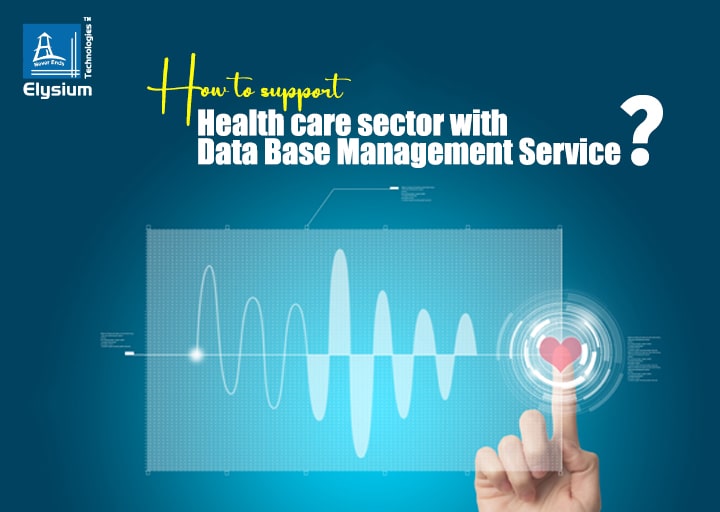- February 24, 2023
- Posted by: Sundaresh KA
- Categories: Business Intelligence Services, Data Analytics Technology, Data Engineering Service

To ensure better care, providers must be well-informed about their patients and associate their health data with the database management service. Time is a limiting factor and providers do not always have the resources to read patient records in detail.
There is an urgent need to improve both the quantity and quality of health data. This could be achieved by including more relevant variables, but ensuring that the records are complete, up-to-date, and validated for all patients. More data means more interpretations. These interpretations can become complicated for health care providers as data sets grow, science continues to evolve, new guidelines are released, and new treatments are discovered.
Database management service help interpret health data using up-to-date knowledge and suggest personalized care plans and treatments for each patient. As mentioned earlier, healthcare data is highly dimensioned, with many variables that together describe a patient. Machine learning can be applied to high-dimensional data to predict health conditions and patterns that the human eye may miss. These projections can be aimed at helping specific patient populations or used to describe population-level trends and patterns for authorities and the general public.
Most essential and difficult fields, where every second can make a significant difference. In such an environment, database management service is vital in ensuring that healthcare professionals have access to accurate and timely information. Therefore, database management services can help support the healthcare sector in several ways.
Here are some ways how to support the healthcare sector with database management service:
- Improved Patient Care: Accurate and timely data management can help healthcare professionals make informed decisions to improve patient care. With a well-managed database, doctors and nurses can quickly access patients’ medical histories, test results, and treatment plans, allowing them to provide better and more efficient care.
- Data Security: Healthcare providers are legally bound to protect the privacy of their patient’s data. A robust data management service can help ensure that patient information is maintained safe and secure, preventing unauthorized access or data breaches.
- Efficient Resource Utilization: A well-managed database can help healthcare providers track resources, such as hospital equipment, medication, and staff, more efficiently. This can lead to better resource utilization and improved patient care.
- Predictive Analytics: Healthcare providers can use data management services to analyze large sets of patient data to identify trends and patterns that can help with disease prevention, early detection, and treatment planning.
- Improved Communication: Data management services can also improve communication between healthcare professionals, making it easier to share information and collaborate on patient care plans.
- Compliance with Regulations: Healthcare providers are subject to strict regulations and guidelines when it comes to data management. A professional data management service can ensure that healthcare providers meet these regulations and guidelines, avoiding costly fines and legal repercussions.
- Efficient Management of Patient Data: Healthcare providers collect an enormous amount of patient data, including medical histories, test results, and treatment plans. A well-managed database can help store and manage this data, making it easier for healthcare professionals to access and use it when needed.
- Efficient Data Retrieval: Database management service allows healthcare providers to retrieve patient data quickly and efficiently. This fast access to patient data is critical in crises when time is of the core.
- Streamlined Healthcare Operations: A well-managed database enables healthcare providers to streamline their operations. By automating routine tasks and improving workflow, healthcare providers can save time and improve efficiency.
Database Management Service Improving the Value of Healthcare
Healthcare database management service offer significant opportunities for monitoring and improving the value of healthcare services. This improves patient well-being. Health care providers are finding ways to use information about costs, access to appropriate and effective treatment and care, and the quality of services patients receive.
Any agency or external group of petitioners may access this information for a variety of purposes. The data are useful for quality assurance and improvement programs aimed at health planning at the local level. This information can provide important answers to policy questions related to sector reform.
Conclusion
Healthcare organizations around the world are in the process of transitioning from paper-based document management systems to storing records electronically. Health databases managemenet service have the potential to lead medical care to a better place. Information exchange between organizations also improves patient access to better care. Appropriate measures with additional security features to protect patient data should be used whenever and wherever necessary.
Patients should also be provided with clear knowledge regarding how their data is kept, used and saved to manage security considerations. As the medical field rapidly changes, the need for the right technology with better information management increases. B. Health Database. Therefore, we need to better understand and practice the impact of technology on data management.
Database management service at Elysium Technologies can significantly benefit the healthcare sector in many ways. Improved patient care, data security, efficient resource utilization, predictive analytics, improved communication, and compliance with regulations are just some of the benefits that healthcare providers can expect from professional data management services.

